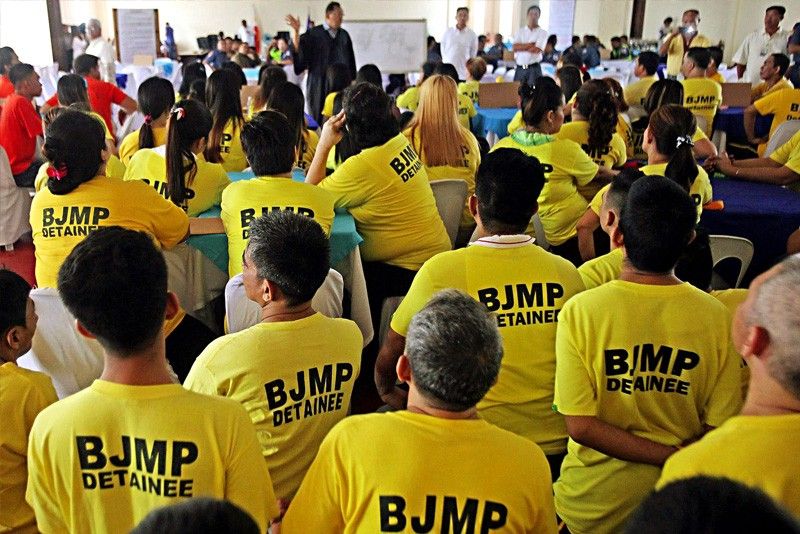Plea bargain eases drug case backlog

MANILA, Philippines — The move of the Supreme Court (SC) to allow minor drug offenders to plead guilty to lesser offenses has immediately borne fruit.
In Tagaytay, where cases before the trial courts are mostly drug-related, about 500 detainees were released last week upon implementation of the SC decision last year allowing plea bargaining agreement in less serious drug cases.
Tagaytay Regional Trial Court Executive Judge Jaime Santiago granted the plea bargain deals initiated by public attorneys for the indigent detainees who have spent years in the city jail.
“The Supreme Court resolution is really a big help for us. We were able to release about 500 detainees in just two days, thanks to this latest rule on plea bargaining for drug cases,” Santiago told The STAR in an interview last Thursday.
Santiago, a former sharp-shooting Special Weapons and Tactics official of the Manila Police District, admitted the latest measure taken by the SC to declog court dockets and address jail congestion is specifically beneficial for his sala.
Santiago handles about 4,500 cases in his branch where 66 percent of the cases or about 3,000 cases involve drug-related offenses.
“It’s really hard to handle such a big case load. There are drug cases that I could hear only twice a year due to the very tight court calendar,” he lamented.
Santiago has been the judge of the single RTC in Tagaytay for the past five years. The SC’s office of the court administrator only designated two assisting judges to help him in resolving the cases before the RTC – Manila RTC Judge Jose Lorenzo dela Rosa and Makati RTC Judge Ethel Gutay.
A new family court was created in the city under newly appointed Judge Raquel Aspiras-Sanchez.
Asked how he manages such a case load – probably the biggest for an RTC judge – Santiago said it is just a matter of setting priorities.
“I prioritize old cases. Imagine I still have cases for violation of (Republic Act) 6425. That’s the old drugs law,” the former Manila judge revealed. RA 6425 was the anti-drug law since 1972 until it was repealed by RA 9165 or Comprehensive Dangerous Drugs Act of 2002.
While the latest action taken by the high court immediately led to positive results, Santiago believes the previous measures implemented were also effective.
“The mediation and JDR (Judicial Dispute Resolution) have so far been effective, especially in civil cases. We are able to dispose many cases by convincing parties to just settle and come up with compromise so they don’t need to go to lengthy trial anymore,” he explained.
Courts nationwide started to implement the new rule on plea bargain deal in drug cases after the SC recently issued the framework for its implementation.
Under the plea bargaining framework, an accused charged with violation of possession of drugs where the quantity is less than five grams (in case of shabu, opium, morphine, heroin and cocaine, and less than 300 grams in case of marijuana) with a penalty of 12 years and one day to 20 years in prison and a fine of P300,000 to P400,000, the accused can plea bargain to a violation of Section 12 on possession of drug paraphernalia and apparatus with a penalty of six months and one day to four years in prison and a fine ranging from P10,000 to P50,000.
If the accused admits using drugs or denies it but is found positive after testing, he or she should undergo rehabilitation for a period of not less than six months, the SC stated.
The SC, however, stressed the plea bargaining would not be allowed in cases punishable by life imprisonment or death, including violations of Section 5 of Republic Act 9165 or the Comprehensive Dangerous Drugs Act of 2002 on sale, trading, administration, dispensation, delivery, distribution and transport of all kinds of dangerous drugs.
The ruling was issued in August last year upon petition by Salvador Estipona, an accused in a drug case, against Legaspi City RTC Branch 3 Judge Frank Lobrigo.
It held that Section 23 of RA 9165, which prohibits plea bargaining in any drug case, was contrary to Article 8, Section 5 (5) of the 1987 Constitution, which gives the SC the authority to allow plea bargaining.
This section guarantees “protection and enforcement of constitutional rights, pleading, practice and procedure in all courts, the admission to the practice of law, the integrated bar and legal assistance to the underprivileged.”
“Such rules shall provide a simplified and inexpensive procedure for the speedy disposition of cases, shall be uniform for all courts of the same grade and shall not diminish, increase or modify substantive rights. Rules of procedure of special courts and quasi-judicial bodies shall remain effective unless disapproved by the Supreme Court,” the SC explained.
Estipona was reportedly caught in possession of .084 grams of shabu. He was charged for violation of Article 2, Section 11 of RA 9165.
Estipona, represented by the Public Attorney’s Office (PAO), questioned Lobrigo’s decision to deny his motion for plea bargain agreement.
The PAO revealed that over 82,000 petty drug offenders have been languishing in prisons nationwide.
- Latest
- Trending


























